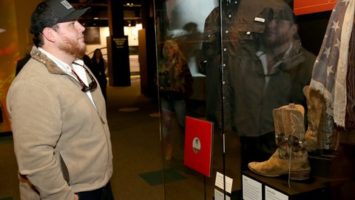
It’s been almost six years since the world met Deacon Claybourne. When Nashville premiered in 2012, Charles Esten moved to the real-life Nashville to take on the starring role as singer, songwriter, lover, friend, uncle, brother, and eventually husband and father.
The world has fallen in love with Claybourne, and Esten already feels emotional about heading into the final season of the show.
“It certainly is bittersweet wrapping up for sure, but the sweet part is that we get to be real proud of what we’ve done,” Esten told CMT.com, “and we get to finish it right instead of on a cliff-hanger that never got answered.” His hope is that Nashville will always be a part of Nashville.
When Esten reflected on his favorite scenes from the show — like the time he gave Maddie a guitar lesson, and the time he was in the elevator with Rayna — he came up with a list of about five big moments that were important, intrinsic and even a little iconic to him.
When the Deacon/Rayna fire started back up:
“There’s a scene where Deacon and Rayna are walking on a bridge in the pilot episode, and it established so much because that was the first time we thought there might be a little chemistry there. And something to build on in terms of that. Also, early on, when Deacon and Rayna sang ‘No One Will Ever Love You’ at the Bluebird. That song became a catalyst for the whole show, because Deacon had been standing 15 feet from her playing guitar for all these years while she was with Teddy and then all of a sudden, they sit down and there’s this one song that’s a little too close to the bone. And it starts this fire. They say in this town it all starts with a song. And in a real way, Nashville started as that song to me.”
When they all played for the military:
“It was a real major chapter when Deacon and Rayna and Maddie and Daphne stood out on the stage at Ft. Campbell and played ‘A Life That’s Good’ in front of all those military audiences. I honestly can’t think of a better place or a way for them to come together. If you’re going to do anything with country music and you don’t touch on the military connection between country music and our military, then you’re not quite doing it right. And of all things to get to sing to those families that know so much about sacrifice and the important things in life, and to get to stand right there for the first time as a family, that to me was the perfect place to do it. And when you consider we were actually surrounded by real military families in that moment, it made it really very memorable to me.”
When there was a struggle in the success:
“I thought Scarlett’s ride was very interesting. For this city to be a launch pad, and fuses get lit and rockets go flying and you can ascend so quickly. But there’s a struggle of making it, too. And as thrilling as that is to see someone’s career take off, you see something in their eyes that is a little exhausted and a little nervous. It’s something they’re dealing with their new paradigm. They’re dealing with their new world as wonderful as it is, still trying to get their bearings. Plus they’re wiped out tired because there are so many demands on them on a new artist. It was interesting watching Scarlett deal with that because for her it was all too much. Some people don’t chase it like others do. Greatness is thrust upon them. It’s been interesting watching her journey. She has never had the single-mindedness to do that. The lyrics she wrote and what she did with Gunnar, and to start writing and playing that music and the two of them just took off. Fame is something to be dealt with. It’s certainly something to be enjoyed, but that’s the simple side of it. It’s something to be endured almost.”
When the music is in good hands:
“Early on, I was very fortunate to get to sit in a room with T-Bone Burnett more than a few times and we were so blessed to have our music under his care for the first season. From there, it was handed to Buddy Miller. And now Tim Lauer. But in those early days, just getting to sit there with T-Bone — I’ve played guitar for years — and a few small beautiful things changed everything for me and even my perception of what a song is. We used to talk an awful lot about being truthful in your performing: when you’re singing a song, when you’re playing a song, and when you’re trying to get to the heart of what the truth of the song is. It occurred to me instantly that it’s no different than acting and trying to get to the heart and the truth of what a scene is.”
When Charles becomes Deacon:
“When I’m performing a song, the more I’m play-acting at it and the more it is surface and exterior performing, the less connected I am to it. I don’t want it to be that. If I’m playing Deacon from the outside, it’s not deeply connected into the heart of me, then I’m missing something, I’m not doing it right. What I’ve learned about acting has influenced my songwriting, singing and performing. And what I’ve learned about songwriting, singing and performing has affected my acting.
“And so I’m real lucky.”
Nashville‘s farewell season returns on Thursday (Jan. 4).
This Article Was Originally Posted at www.CMT.com
http://www.cmt.com/news/1789867/charles-estens-fave-five-moments/


